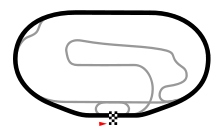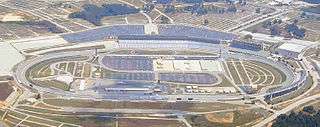2000 NAPA 500
| Race details[1] | |||
|---|---|---|---|
| Race 34 of 34 in the 2000 NASCAR Winston Cup Series season | |||
 Atlanta Motor Speedway (after 1997, before Atlanta International Speedway) | |||
| Date | November 20, 2000 | ||
| Official name | NAPA 500 | ||
| Location | Atlanta International Raceway, Hampton, Georgia | ||
| Course |
Permanent racing facility 1.54 mi (2.502 km) | ||
| Distance | 328 laps, 500.5 mi (813.12 km) | ||
| Weather | Cold with temperatures approaching 55.4 °F (13.0 °C); wind speeds up to 18.1 miles per hour (29.1 km/h) | ||
| Average speed | 141.296 miles per hour (227.394 km/h) | ||
| Pole position | |||
| Driver | Hendrick Motorsports | ||
| Most laps led | |||
| Driver | Jerry Nadeau | Hendrick Motorsports | |
| Laps | 155 | ||
| Winner | |||
| No. 25 | Jerry Nadeau | Hendrick Motorsports | |
| Television in the United States | |||
| Network | ESPN | ||
| Announcers |
Bob Jenkins Benny Parsons Ned Jarrett | ||
The 2000 NAPA 500 was a NASCAR Winston Cup Series racing event that was held on November 20, 2000, at Atlanta Motor Speedway in Hampton, Georgia. It was originally scheduled for November 19 but was postponed due to rain and run on Monday.
Jerry Nadeau won the race for his only NASCAR Winston Cup Series victory. Scott Wimmer would begin his NASCAR Winston Cup Series career at this event while Darrell Waltrip would end his racing career at this event. Bobby Labonte, who had clinched the Winston Cup championship the previous week by finishing 4th in the Pennzoil 400 presented by Discount Auto Parts, finished 5th.[2]
Many of the historic driver/sponsor combinations would never be used again after this race; for example, the famous Jeff Gordon "rainbow car" with the DuPont sponsorship would not return for the 2001 season, in favor of a flame-themed color pattern that would last from 2001 to approximately 2011. This was also the final ESPN NASCAR broadcast for 7 years, and also for the broadcast trio of Bob Jenkins, Benny Parsons, and Ned Jarrett. Jenkins would remain with ESPN, Ned Jarrett retired and Benny Parsons would resurface on NBC's telecast of NASCAR racing from 2001-2006.
Atlanta Motor Speedway would never again host the closing event for the NASCAR Cup Series after the conclusion of this racing event. It was to host the final race in 2001 but because of the September 11 attacks, the New Hampshire 300, originally scheduled for September 16, was moved to the week following the NAPA 500 and became that year's season finale. The final race of the season moved to Homestead-Miami Speedway in the 2002 NASCAR Winston Cup Series season; where it remains today.
Background
Atlanta Motor Speedway is one of ten intermediate to hold NASCAR races; the others are Charlotte Motor Speedway, Chicagoland Speedway, Darlington Raceway, Homestead Miami Speedway, Kansas Speedway, Kentucky Speedway, Las Vegas Motor Speedway, New Hampshire Motor Speedway, and Texas Motor Speedway.[3] The standard track at Atlanta Motor Speedway is a four-turn quad-oval track that is 1.54 miles (2.48 km) long.[4] The track's turns are banked at twenty-four degrees, while the front stretch, the location of the finish line, and the back stretch are banked at five.[4]
Summary
Approximately 14% of the race was run under a caution flag; the average green flag run was 31 laps. Several accidents and oil spills caused eight caution periods for 44 laps.[5] A total distance of 325 laps were finished in 3 hours, 32 minutes and 32 seconds. Jerry Nadeau beat Dale Earnhardt to the finish line by 1.338 seconds to win the race (his first and only victory in Winston Cup competition). ESPN's Bob Jenkins, calling his last Winston Cup event for ESPN, called the finish thus:
| “ | Back in March of '81, Darrell Waltrip took the checkered flag to win the very first race we televised on ESPN...and in November of 2000...Jerry Nadeau wins the final race on ESPN! | ” |
This was the last points race Dale Earnhardt would finish before his death at the 2001 Daytona 500.[5] The race was officially started shortly after 1:00 PM Eastern Standard Time and finished at approximately 4:32 PM EST.[6]

Geoff Bodine finished last due to an engine problem on lap 11. Buckshot Jones was the lowest finisher to complete the event, finishing in 37th place, 48 laps behind the lead lap drivers. In his final NASCAR Winston Cup race before his retirement, Darrell Waltrip finished in 34th place, 7 laps behind Jerry Nadeau; for the 2001 season, Waltrip would begin working as a color commentator for Fox Sports' coverage of Winston Cup racing. Waltrip's retirement also ended a rocky relationship between himself and Travis Carter Motorsports that lasted since the 1998 NASCAR Winston Cup Series season. In the views of certain fans, the final years of Waltrip's NASCAR career had involved him taking a metaphorical back seat to Jeff Gordon and Jeremy Mayfield; who were just rising stars back then. Darrell Waltrip's career with Fox Sports begun with the Budweiser Shootout on February 11, 2001. The following week, Waltrip provided commentary for the fateful Daytona 500 race in which the death of Dale Earnhardt occurred on that race's final lap.
43 drivers, all born in the United States of America qualified for the NAPA 500, driving either Chevrolet, Ford or Pontiac cars. 13 other drivers failed to qualify, including Dick Trickle, Hut Stricklin, Morgan Shepherd and Hermie Sadler.[5] Individual race earnings for each driver ranged from $180,550 to Jerry Nadeau ($248,513.56 when adjusted for inflation) to $34,982 to last-place finisher Geoff Bodine ($48,150.10 when adjusted for inflation). The total purse for the event was $2,336,442 ($3,215,937.46 when adjusted for inflation).[7]
This was the last NASCAR race of the 20th century and of the 2nd millennium. While the price of gasoline and oil would remain cheap throughout the first five years of the 21st century, the constant threat of fossil fuel depletion eventually caused NASCAR to adopt electronic fuel injection as a fuel-saving measure. Concern for the environment also caught the eye of NASCAR officials during the 21st century; they would make an attempt to reduce the carbon footprint that NASCAR elevated during the 1970s, 1980s, and 1990s.[8][9][10]
Top 20 finishers
- Jerry Nadeau
- Dale Earnhardt
- Ward Burton
- Jeff Gordon
- Bobby Labonte
- Mike Skinner
- Rusty Wallace
- Sterling Marlin
- Matt Kenseth, 1 lap down
- Johnny Benson, Jr., 1 lap down
- Bill Elliott, 1 lap down
- Jeff Burton, 1 lap down
- Robert Pressley, 1 lap down
- Todd Bodine, 1 lap down
- Dale Jarrett, 2 laps down
- Bobby Hamilton, 2 laps down
- Terry Labonte, 2 laps down
- Dave Blaney, 2 laps down
- John Andretti, 2 laps down
- Dale Earnhardt, Jr., 3 laps down
Timeline
- Start of race: Jeff Gordon started the race with the pole position
- Lap 5: Jerry Nadeau took over the lead from Jeff Gordon
- Lap 11: Geoffrey Bodine had an engine problem, making him the last-place finisher
- Lap 14: Caution due to Geoffrey Bodine's accident, ended on lap 17
- Lap 18: A problematic engine forced Elliott Sadler out of the race
- Lap 21: Caution due to oil on the track, ended on lap 26
- Lap 27: Jeremy Mayfield took over the lead from Jerry Nadeau
- Lap 37: Mandatory competition caution handed out by NASCAR officials, ended on lap 40
- Lap 38: Ward Burton took over the lead from Jeremy Mayfield
- Lap 47: Jeremy Mayfield took over the lead from Ward Burton
- Lap 53: Jeremy Mayfield had to leave the race due to a faulty engine; causing Jerry Nadeau to take over the lead
- Lap 54: Caution due to oil on track, ended on lap 60
- Lap 55: Scott Wimmer took over the lead from Jerry Nadeau
- Lap 64: Steve Park took over the lead from Scott Wimmer
- Lap 69: Caution due to Michael Waltrip's accident, ended on lap 74
- Lap 82: Dale Earnhardt took over the lead from Steve Park
- Lap 94: Jerry Nadeau took over the lead from Dale Earnhardt
- Lap 111: Caution due to Tony Stewart's accident, ended on lap 115
- Lap 112: Kenny Wallace took over the lead from Jerry Nadeau
- Lap 113: Jerry Nadeau took over the lead from Kenny Wallace
- Lap 122: Mark Martin failed to finish the race because his engine acted up
- Lap 125: Michael Waltrip was involved in a terminal crash
- Lap 130: Caution due to Michael Waltrip's second accident, ended on lap 135
- Lap 195: Buckshot Jones was involved in a terminal crash
- Lap 196: Jerry Nadeau took over the lead from Bobby Labonte
- Lap 257: Ward Burton took over the lead from Jerry Nadeau
- Lap 297: Jerry Nadeau took over the lead from Ward Burton
- Lap 300: Mike Skinner took over the lead from Jerry Nadeau
- Lap 301: Ward Burton took over the lead from Mike Skinner
- Lap 313: Caution due to Scott Pruett spinning out of control in the backstretch, ended on lap 318
- Lap 319: Jerry Nadeau took over the lead from Ward Burton
- Finish: Jerry Nadeau was officially declared the winner of the event
Standings after the race
| Pos | Driver | Points[5] | Differential |
|---|---|---|---|
| 1 | Bobby Labonte | 5,130 | 0 |
| 2 | Dale Earnhardt | 4,865 | -265 |
| 3 | Jeff Burton | 4,841 | -289 |
| 4 | Dale Jarrett | 4,684 | -446 |
| 5 | Ricky Rudd | 4,575 | -555 |
| 6 | Tony Stewart | 4,570 | -560 |
| 7 | Rusty Wallace | 4,544 | -586 |
| 8 | Mark Martin | 4,410 | -720 |
| 9 | Jeff Gordon | 4,361 | -769 |
| 10 | Ward Burton | 4,152 | -978 |
References
- ↑ Weather information for the 2000 NAPA 500 at The Old Farmers' Almanac
- ↑ Notable driver-related events at the 2000 NAPA 500 at Race Database
- ↑ "NASCAR Race Tracks". NASCAR. Retrieved September 2, 2011.
- 1 2 "NASCAR Tracks—The Atlanta Motor Speedway". Atlanta Motor Speedway. Archived from the original on 21 July 2011. Retrieved September 2, 2011.
- 1 2 3 4 2000 NAPA 500 racing information at Racing Reference
- ↑ Benson, Ince seek revenge in Atlanta at Motorsport.com
- ↑ Winnings information for the 2000 NAPA 500 at Fantasy Racing Cheat Sheet
- ↑ NASCAR sets fuel injection for '12 but keeping restrictor plates at USA Today
- ↑ NASCAR Moves to Fuel Injection, Bosch First Approved Supplier at Auto Service World
- ↑ Bosch to provide oxygen sensors for fuel injection at NASCAR.com
| Preceded by 2000 Pennzoil 400 |
NASCAR Winston Cup Series Season 2000-01 |
Succeeded by 2001 Daytona 500 |